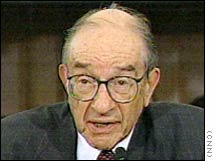 |
| Alan Greenspan is set to retire in January after 18 years as Fed chairman. |
|
|
|
|
|
JACKSON HOLE, Wyo. (CNN/Money) -
Federal Reserve Chairman Alan Greenspan issued a veiled warning Friday on the risks to the economy from trade and budget deficits -- as well as the recent run-up in home prices.
In his opening remarks at a Fed conference here, Greenspan, who is set to retire in January, said the central bank needs to pay closer attention to trade barriers, changes in assets and liabilities such as rising home prices and mortgage financing.
"Our analysis of economic developments almost surely will need to deal in greater detail with balance sheet considerations than was the case in the earlier decades of the postwar period," Greenspan said in his prepared remarks.
"The developing protectionism regarding trade and our reluctance to place fiscal policy on a more sustainable path are threatening what may well be our most valued policy asset: the increased flexibility of our economy, which has fostered our extraordinary resilience to shocks," he added.
"If we can maintain an adequate degree of flexibility, some of America's economic imbalances, most notably the large current account deficit and the housing boom, can be rectified by adjustments in prices, interest rates, and exchange rates rather than through more wrenching changes in output, incomes, and employment."
The Fed chairman, who has led the central bank on a path of 10 consecutive quarter-percentage point hikes in short-term interest rates since June of 2004, gave no new hints on the direction of interest rates in his remarks.
An eye on home values
Several economists have warned that much of the nation's economy is being driven by the steady rise in home prices, which has buoyed consumer spending. But economists also worry that the use of non-traditional financing like interest-only mortgage loans could lead to a sharp decline in home prices if interest rates spike -- popping what some see as a housing bubble.
Greenspan has repeatedly said he doesn't believe there is a bubble in the national housing market, although Friday he suggested the economy could take a hit if Americans come to see their home price gains as at risk.
"What they perceive as newly abundant liquidity can rapidly disappear," he said in his remarks. If investors grow more cautious about the stock or housing market, this could prompt a reversal that would in turn lead to "the liquidation of the debt that supported higher prices," he said.
This is Greenspan's final appearance as Fed chief, and investors are watching his remarks for signs of any change in policy strategy and his views on the challenges that will face the chairman who succeeds him.
Many economists have been waiting to see how Greenspan analyzes the policies he has laid down for nearly two decades.
In his remarks, he summed up the approach as not relying on a single variable like money supply or inflation but instead "the paradigm on which we have settled has come to involve at its core crucial elements of risk management."
While Greenspan has generally won mostly praise for his leadership of the central bank, he's received some criticism for standing on the sidelines as the stock market bubble grew in the late 1990s, only to burst in early 2000. Some have suggested he's made the same mistake as housing prices have risen in recent years.
Greenspan might have been thinking about his legacy when he warned that, ""History has not dealt kindly with the aftermath of protracted periods of low risk premiums."
-- CNN/Money senior writer Chris Isidore contributed to this report

|